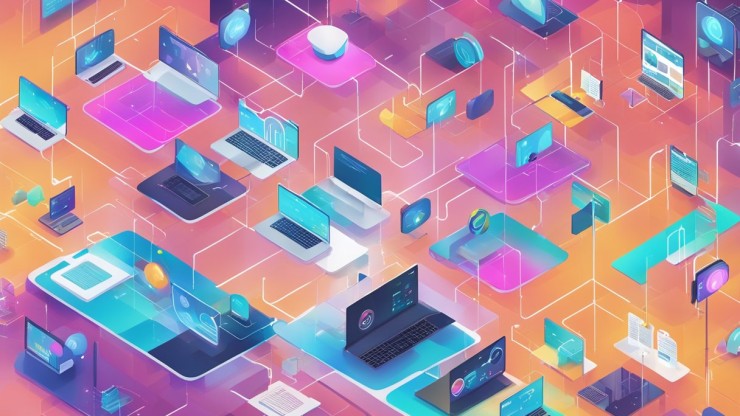AI Jobs Remote: Navigating the New Landscape of Technology Careers

-
System Admin
-
Jan 31, 2024
-
86
The employment landscape is undergoing a significant transformation spurred by artificial intelligence (AI) advancements. As AI technologies become increasingly integrated into many sectors, the job market evolves, offering novel opportunities in AI-oriented roles that can be performed remotely. Those interested in AI sales, AI content assistance, AI writing, AI training, and AI data annotation are finding many job openings that cater to different levels of expertise, from seasoned professionals to those seeking entry-level positions. Even individuals without prior experience are finding openings as AI trainers or prompt engineers, underscoring the inclusive growth of the remote AI job sector.

The rise of remote AI jobs reflects a broader trend of work decentralization and the growing demand for talent that can operate anywhere globally. This flexibility attracts a diverse pool of candidates capable of contributing to AI developments from the comfort of their homes. Specialists in market analysis have noted an uptick in the number of companies seeking remote AI professionals; these companies are not only looking to leverage AI for improving business processes but are also aiming to enhance customer engagement and drive innovation through these roles.
As the AI industry continues to expand, the conversation often turns to the potential of AI replacing specific jobs. While it's true that automation and AI can lead to the displacement of some positions, they also create new job categories, many of which can be remote. Understanding the dynamic relationship between AI's growth and job creation is critical for job seekers and employers aiming to harness the capabilities of AI without compromising the workforce. The remote AI job market, therefore, not only stands as a beacon of modern employment possibilities but also as an arena for continuous learning and growth in the ever-evolving technological landscape.
Remote AI Job Landscape

As artificial intelligence (AI) technology evolves, the remote job market reflects a growing demand for AI-related roles across various industries. This demand highlights the need for diverse skills, addressing the creation and deployment of AI systems.
AI Remote Jobs Market Overview
United States: The remote AI job market in the United States is experiencing a significant upsurge, particularly for roles such as remote AI writing jobs, remote AI trainer jobs, and entry-level AI jobs remote. Opportunities range from AI content assistant jobs requiring creative applications of AI in content creation to more technical positions like AI prompt engineer jobs remote. The market also accommodates those without extensive experience through openings like AI remote jobs experience and remote AI jobs entry level. AI data annotation jobs remotely serve as a standard entry point into the field.
The job landscape is bolstered by competitive market analysis tools and market research, which underscore the rapid growth of remote AI positions. For those with specialized skills, train AI jobs remotely, and AI annotation jobs offer the chance to contribute to developing AI models through training data curation and annotation.
Remote Work Trends: Remote work flexibility is not just a trend but a standard practice within the tech industry. This paradigm shift to remote work culture lends itself well to the AI sector, where many tasks can be performed virtually, thus expanding job opportunities beyond geographical constraints.
Impact of AI on Job Creation
Job Creation: AI is changing the nature of jobs available and creating new employment categories. Jobs like AI content assistants and AI prompt engineers, which did not exist a decade ago, are now emerging as vital roles within organizations. This evolution is part of a broader trend where AI generates jobs that require a specialized understanding of how machine learning models operate and how they can be applied across various domains.
Concerns and Realities: While there are concerns about AI replacing jobs, particularly in sectors that can automate processes through technology, current trends show that AI is also catalyzing the creation of roles that demand human oversight, critical thinking, and creative problem-solving capabilities. As AI continues to augment many job functions, the emphasis on remote work supports a forward-moving job market in which AI and humans collaborate, leading to an ecosystem of tech-driven employment opportunities that did not exist.
Education and Skills for AI Careers

The artificial intelligence (AI) industry is rapidly expanding, and a strong foundation in relevant education and skills is crucial for those looking to enter this field. AI careers require technical knowledge, practical experience, and continuous learning.
Essential Qualifications for AI Professionals
Professionals aiming to secure a position in AI fields, such as AI sales jobs remote or AI content assistant jobs, typically hold a bachelor's degree in computer science, data science, or a related field. This foundational education equips candidates with the necessary understanding of algorithms, machine learning, and computational thinking. Critical technical skills include programming in Python, R, or Java.
Beyond undergraduate education, many roles, such as software engineer positions in AI, frequently require a graduate-level degree or specialized certification. Advanced degrees delve deeper into AI principles and often involve research and the development of new AI technologies.
AI Training and Development
Due to its evolving nature, continuous professional development is essential in AI. Candidates are often expected to pursue ongoing training, such as certifications in specific AI technologies or systems. These training programs can be found through various platforms, including AI training remote jobs designed to help AI professionals stay current with the latest advancements.
Professionals must also develop strong analytical and problem-solving skills and the ability to work with large datasets. Many AI roles, such as those in AI data annotation, require meticulous attention to detail and a clear understanding of the data's context within machine learning models. Being effective in these roles also means clearly articulating complex concepts, a critical skill for AI prompt engineers and trainers.
AI Remote Jobs for Beginners

The rise of artificial intelligence created many remote job opportunities suitable for those just starting out in the tech industry. Here, we focus on entry-level positions and the avenues available to build a career in AI, even for individuals without prior experience.
Entry-Level AI Jobs and Opportunities
For those seeking to break into the field of AI from a remote setting, entry-level AI jobs are a promising starting point. Opportunities range from freelance gigs to more formalized roles within companies. A notable entry point is the role of an AI Data Annotation Specialist, which involves labeling and categorizing data for machine learning algorithms. This role often requires no previous experience and is a practical first step into the AI industry.
Other beginner-friendly positions include Technical Content Writer roles focused on AI technologies. These jobs may be remote and typically involve creating guides, articles, and documentation that make complex AI concepts accessible to a wider audience. Solid communication skills and a desire to learn about AI sometimes compensate for a lack of technical background, making these roles attractive for aspiring technical writers interested in AI.
Building a Career in AI Without Experience
For individuals without experience, the pathway to a career in AI is still accessible. Many remote AI jobs offer on-the-job training, allowing diligent learners to start as AI trainers or assistants and gain practical skills. Becoming an AI Prompt Engineer or an AI Content Assistant is also possible. These positions focus on designing prompts and assisting in creating AI-generated content, providing essential services to companies, and facilitating AI-human interactions.
The key for beginners is to emphasize transferable skills and willingness to learn. Companies may value problem-solving abilities, adaptability, and collaborative skills just as much as formal qualifications. Networking, joining AI-related online communities, and continuously educating oneself on AI trends and technologies can dramatically improve prospects for those aiming to secure remote AI jobs with no experience.
AI Sales and Marketing Roles

Professionals leverage AI tools in AI sales and marketing to improve customer relations and drive sales performance. These roles often demand a blend of technological proficiency and sales acumen.
AI in Sales and Customer Engagement
In sales and customer engagement, AI aids in analyzing customer data to predict purchasing patterns, personalize marketing efforts, and optimize sales strategies. Sales representatives use AI to provide tailored solutions to prospects, while account executives utilize robust AI tools to forecast sales and manage relationships. Social media managers may also apply AI for targeted campaigns and to analyze consumer sentiment.
Remote AI Sales Jobs
The demand for remote AI sales jobs is growing, with positions such as sales trainers, account executives, and others available to talented individuals, irrespective of location. These professionals are often tasked with conducting virtual training sessions, managing sales pipelines, and achieving targets through AI-powered CRM platforms. Remote sales roles allow for a more excellent work-life balance while maintaining high productivity levels.
For those interested in pursuing a career in this field, several opportunities exist for Remote AI sales Jobs, from entry-level to senior positions. Remote work options in AI sales are expansive, with positions available to train AI systems and collaborate with teams across the globe. Remote roles can offer flexibility and a chance for professionals to become part of the evolving landscape of AI in sales and marketing.
Specific AI Remote Roles Explained

With the AI industry's exponential growth, remote roles have become prevalent, catering to various specializations within the field. Each position serves a unique function in developing and refining AI technologies.
AI Trainer and Educator Positions
AI Trainer roles often involve developing training materials, conducting workshops, and educating AI and its handlers. These professionals may work with machine learning algorithms, focusing on improving AI's learning process through data. For example, a Remote AI Trainer might teach AI systems to recognize speech patterns or visual data more accurately. Positions like these often require proven experience in a sales or technical leadership role.
AI Content Creation and Writing Jobs
Content creation and writing positions in the AI space often center around generating text that is either used by AI or about AI technologies. For instance, an AI Content Assistant may create informative material to assist AI algorithms in learning context and nuances in human languages. Meanwhile, AI Writing Jobs may include content writers who develop educational and marketing materials for AI products and may be involved in data analytics to understand how their content performs.
AI Data Annotation and Engineering Jobs
Data Annotation specialists play a crucial role in AI development by labeling data that AI uses to learn. These jobs require attention to detail and can often serve as entry-level positions within the AI industry. On the engineering side, a Machine Learning (ML) Engineer harnesses complex datasets to train AI algorithms, involving data analytics and data visualization skills to interpret AI models' results and improve their performance.
Remote Work Dynamics in AI

The landscape of AI jobs is increasingly shifting towards remote opportunities. This trend presents a unique set of benefits and challenges for professionals in the field and demands a particular toolkit for effective collaboration.
Benefits and Challenges of Remote AI Jobs
Benefits:
- Flexibility: AI professionals can often enjoy the flexibility to work from anywhere, which enables a better work-life balance.
- Wider Talent Pool: Employers can access a global talent pool, leading to diverse teams and innovative solutions.
- Cost Savings: Both employers and employees can retain on costs associated with traditional office spaces and commuting.
Challenges:
- Communication Hurdles: Face-to-face interaction can make conveying complex AI concepts more manageable.
- Time Zone Differences: Collaborating across time zones requires careful planning to maintain productivity.
- Network Security: Remote work can increase the risk of data breaches, particularly sensitive in AI development.
Tools and Technologies for Remote Collaboration
- Dynamic Tools:
- Tools like Slack and Microsoft Teams facilitate real-time communication and integrate with AI development environments.
- In-App Messaging:
- Confluence and Trello support in-app messaging that helps document and track AI project progress.
- Just-In-Time User Guidance:
- Platforms like WalkMe provide just-in-time user guidance to help remote AI teams understand complex systems without in-person training.
- Elearning Tools:
- Coursera and Udacity offer courses for upskilling and staying current with the latest shift in AI, which is crucial for remote AI professionals.
By leveraging these technologies, AI teams working remotely can overcome some communication and collaboration barriers they face. The tools support project management and development and help maintain team cohesiveness and continuous learning in the ever-evolving field of AI.
Freelance AI Opportunities

The burgeoning field of artificial intelligence offers a wealth of freelance opportunities for professionals skilled in machine learning, data annotation, and AI-driven content creation. They can leverage platforms dedicated to connecting freelancers with AI projects to find work that suits their skill set.
Becoming a Freelance AI Professional
A freelance AI professional often requires a robust machine learning (ML) or data science background. Many companies seek freelancers who can build, train, and deploy AI models. This can include writing jobs, generating AI-powered content, or training roles where the individual teaches AI systems to improve performance. Freelancers may also be responsible for data annotation, which assists in training AI algorithms. Licensure in specific AI tools or platforms can bolster one's marketability, as well as a portfolio that showcases past projects and achievements.
Platforms and Networks for Freelance AI Jobs
For those seeking freelance AI work, numerous platforms are the primary hubs for remote job opportunities. Networks like Upwork provide a space for AI professionals to find freelance writing jobs, while other platforms might focus on AI training or annotation tasks. These marketplaces often operate on a contract basis, ensuring that freelancers can choose projects that align with their experience and interests. The emergence of platforms specializing in AI, such as GPTeach and other domain-specific networks, suggests an ongoing evolution and demand for skilled freelance ML/AI engineers.
AI in Business and Strategy

Artificial Intelligence (AI) is revamping the landscape of business strategy by offering unprecedented analytical capabilities and insights. Recognizing patterns in vast datasets, AI informs strategic decisions that could lead to significant competitive advantages.
Roles of AI in Strategic Decision-Making
In strategic decision-making, AI strategy consultants leverage machine learning algorithms to examine market trends and consumer behavior. This data-driven approach facilitates more informed decisions, reducing reliance on intuition. AI tools transform complex market analysis into actionable strategies, allowing businesses to swiftly anticipate and adapt to changes.
AI also plays a crucial role in tailoring go-to-market strategies. By sifting through extensive market research, AI pinpoints optimal pricing, distribution channels, and customer segments, aligning products and services with market needs more effectively than traditional methods.
AI for Competitive Advantage in Business
Companies integrate AI into business operations to automate and optimize processes to achieve a competitive edge. Field product go-to-market managers utilize AI to craft targeted campaigns, personalize customer interactions, and forecast sales trends with a degree of accuracy previously unattainable.
AI-powered market analysis tools scrutinize real-time data, allowing businesses to adapt to the evolving marketplace quickly. This agility in strategy and operations enables companies to outpace competitors, often resulting in market leadership.
By deploying AI for strategic functions, businesses refine their current operations and identify novel avenues for growth and innovation, securing their position in the vanguard of their industries.
Career Development in AI

The field of artificial intelligence (AI) provides a dynamic career path packed with opportunities for technological and professional advancement. With AI continuously evolving, professionals in this field are poised to become invaluable assets to the tech industry.
Advancing Your AI Career
Individuals seeking to advance their careers in AI should focus on acquiring a mix of technical expertise, such as proficiency in machine learning algorithms and data annotation, and soft skills, like creative problem-solving and effective communication. Pursuing professional registration in the field can lend credibility and demonstrate a commitment to adhering to industry standards. Entry-level AI jobs remote positions provide a solid foundation from which one can explore specializations such as AI content assistant jobs remote or train AI jobs remote.
Building a portfolio showcasing one's work in AI writing jobs remotely or as an AI prompt engineer can open doors to more advanced positions. An individual might start with remote AI jobs with no experience and achieve growth by contributing to projects that train AI, reflecting a hands-on understanding of the technology.
Networking and Professional Growth
For AI professionals, networking and engagement within the industry are pivotal for staying abreast of the latest technological advancements. Joining associations or international LLCs and participating in conferences can facilitate connections with influential peers and thought leaders. Such interactions can lead to opportunities in AI training remote jobs or even higher-level roles like community engagement manager.
Professionals should actively engage in community events and online forums to exchange ideas and stay informed on new AI developments that could impact their expertise. Constant learning and adaptation are essential in an industry driven by innovation, aiding professionals in securing roles that push the boundaries of what AI can achieve in the workplace.
Future of AI Jobs

The landscape of employment is shifting rapidly with the advent of artificial intelligence. Significant changes in job roles and market availability are expected, challenging traditional employment sectors.
Emerging AI Roles and Sectors
The emergence of AI training jobs indicates a demand for positions such as AI trainers and AI prompt engineers, roles focused on teaching and refining the AI's learning process. Industries like healthcare, finance, and retail increasingly rely on AI for data analysis, customer service, and operational efficiency, leading to an expansion of AI jobs in remote settings. AI annotation jobs are on the rise, too, requiring meticulous attention to detail for data labeling, which is essential for machine learning accuracy.
Predictions for AI Job Market Evolution
It's anticipated that automation may replace specific jobs, particularly those involving repetitive or predictable tasks. Yet, this shift is expected to create new AI maintenance, oversight, and development opportunities. Remote and flexible employment in AI is becoming more prevalent, even for entry-level positions, opening the job market to a broader, global workforce. As AI continues to evolve, open AI jobs will likely require a mixture of technical and soft skills, emphasizing the human element in AI development and ethics.








